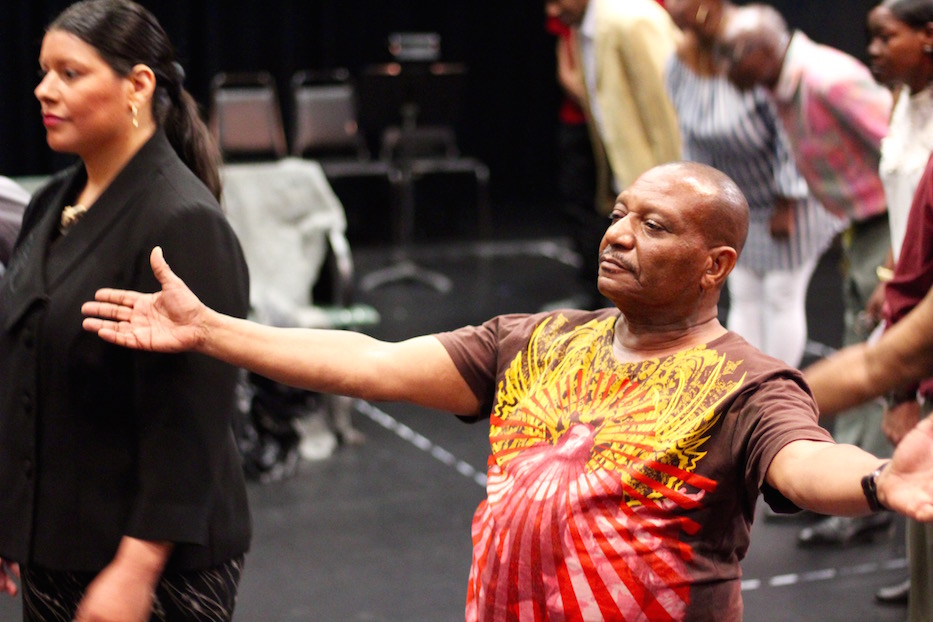
Culture & Community | Integrated Refugee & Immigrant Services (IRIS) | Long Wharf Theatre | Arts & Culture | Tower One/Tower East | Connecticut Mental Health Center
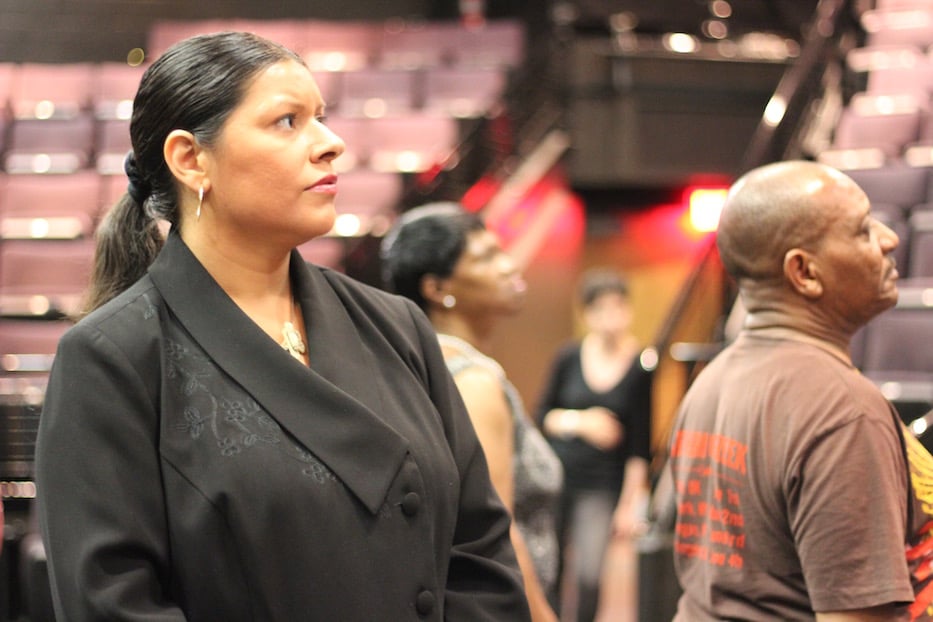
| Diana Martinez Friday night. The cast of Survivors Of Society Rising included: Kevin Creech, Bob Forlano, Alfred Gamble, Mark P. Griffin, Paul Hammer, James Harvey, Tammy Imre, Joe Jackson, Rosalind Lewis, Diana Martinez, Shannon Smith, Do Walker, Betty Williams and Richard Youins. Lucy Gellman Photos. |
Mark Griffin wants help for his drug addiction, but he doesn’t know where to start. He has been homeless for months, and is using again. His earthly belongings live in a trash bag that he carries with him. It droops at his feet. When he finally speaks about his need to get help, his own voice seems like it surprises him.
In another universe, Isador Juda jumps out of a train in Austria, fleeing the Nazis and hoping he will live to see his family again. Divine Mahoundi learns that she will be coming to the United States as a refugee, and seeks out her grandfather for advice. Tammy Imre waits three years for supportive housing, only to learn that she isn’t going to get a fair shot.
Friday and again on Sunday, New Haveners bridged decades and bared souls as part of the New Haven Play Project, the culmination of a year of partnerships between Long Wharf Theatre, the Connecticut Mental Health Center (CMHC), Integrated Refugee and Immigrant Services (IRIS), Tower One Tower East, and Youth Continuum. Both performances unfolded on Long Wharf’s main stage, both drawing hundreds of attendees.
They followed several storytelling events at all five branches of the New Haven Free Public Library, all centered around the theme of “home.”
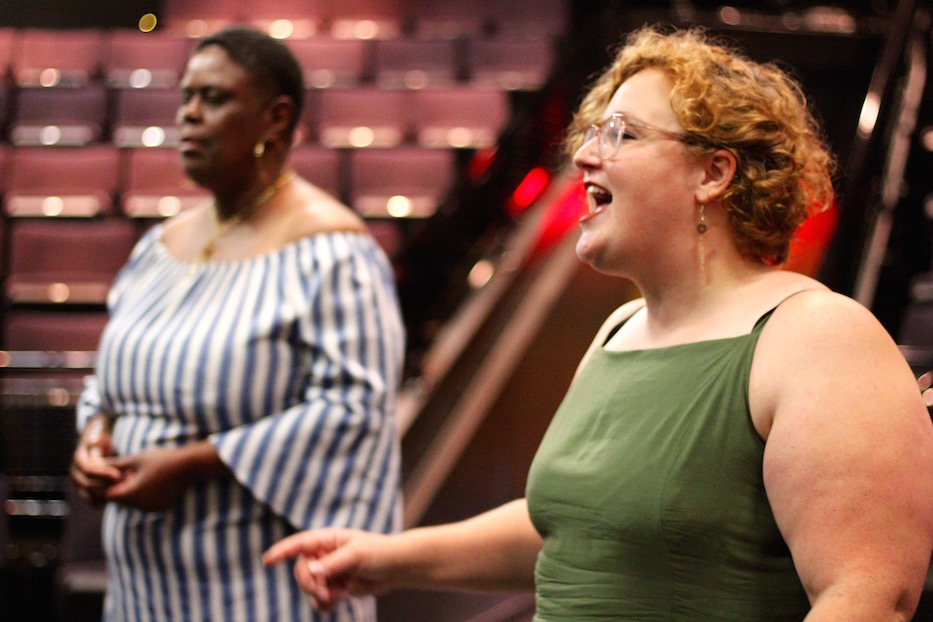
| Elizabeth Nearing (Shannon Smith is in the background). |
“This work of being in community, this is the most important work we do,” said Long Wharf Artistic Director Jacob Padrón Friday, noting that the project is reflective of a new, more community-focused direction in which the theater is moving. “It is theater with, by, and for New Haven.”
“We are committed to being a home where we can hear all our stories,” he added Sunday.
Over the weekend, the three-pronged project found its core in the weight of shared story. On Friday, a cast of 14 New Haveners in recovery (some are clients at CMHC; some are not) presented Survivors Of Society Rising, a new work fully devised and acted by all of them and directed by Long Wharf Community Partnership Manager Elizabeth Nearing and Community Partnership Fellow and dramaturg Madeline Charne.
CMHC Communications Officer Lucille Bruce, Peer Wellness Coach Richard Youins, and theater veteran Alfred Gamble, who is also in recovery, stepped on as co-producers of the work. Bruce said it was transformative for the group to have a "structured space" like Long Wharf, with a full production team behind the cast.
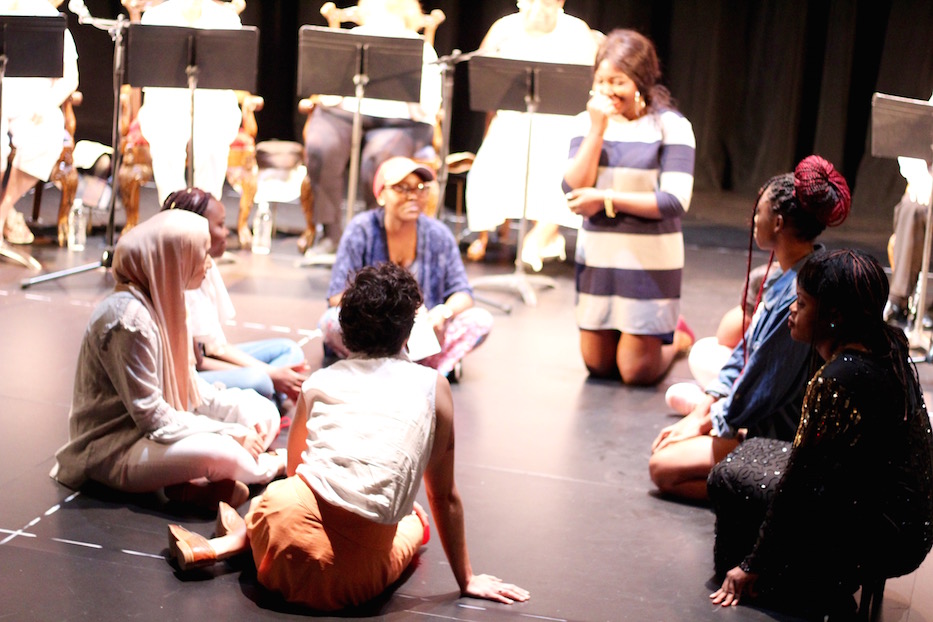
| Members of Elders & Newcomers. IRIS' Young Leaders included Zahara Callender, Josephine and Solange Jacques, Divine Mahoundi, Brie Mighty, Zihada Mkambilwa, Charlotte Mulungula, Elodie Musema, Emmanuella and Lola Mwilelo, and Noor Roomi. Laurel McCormack, who is a case manager and acculturation coordinator at IRIS, served as a staff advisor. |
Sunday, audiences returned for Elders & Newcomers, an hour of personal story and testimony infused with poetry and spoken word, music, dance and magical, often unspoken cross-cultural dialogue between residents of Tower One Tower East and some of America's newest arrivals. In addition to eight residents of the Towers and 11 participants in IRIS’ Young Leaders Program (read more about that here), the performance included readings from Youth Continuum’s Elizabeth Larkin, Chelsi Torres and Pedro Hanlan. It was co-directed by Nearing and playwright Sharece Sellem.
All three projects have been unfolding for the better part of a year, after last year’s performance of The American Unicorn in collaboration with IRIS. In November, Nearing began working with IRIS’ Young Leaders program, which is open to young women who have come to the U.S. as immigrants and refugees (this year, participants ranged in age from 14 to 24 years old). In December, she and Sellem started their work with the Towers, part of an “Elder Play” partnership that is now in its tenth year.
And then in March, she and Long Wharf began working with CMHC, which has done an acting project with Theatre of the Oppressed NYC (TONYC) for three years before this collaboration. In addition to 10 people who had worked with TONYC, four more joined.
“I want you to breathe and I want you to express gratitude toward each other,” Nearing said to the Survivors cast Friday, just before the house opened. “You make this happen.”

| Richard Youins: "I've seen the light at the end of the tunnel. I ask you: give them hope." |
And they did, over and over again. Friday centered that acute sense of truth-telling and community, as the lights came up on a rhythmic, choreographed phalanx of actors who were playing, with equal parts nuance and bravery, themselves. Moving with each iteration of the word “rise,” cast members shouted out afflictions over which they themselves have risen (and, perhaps, are still rising): racism, sexism, patriarchy among others.
But they also shouted out things that have allowed them to rise together and individually: brotherhood, sisterhood, community, fun. As if to say: there are going to be a lot of both tonight, so buckle up.
That complexity—that in the light there is also darkness, or maybe the other way around— defined the performance, a series of tightly knitted, multi-part vignettes around addiction, substance abuse, and recovery. In one, Tammy Imre and James Harvey sat across from each other in a housing office, Imre waiting to hear that she had received subsidized housing after three years on a waiting list.
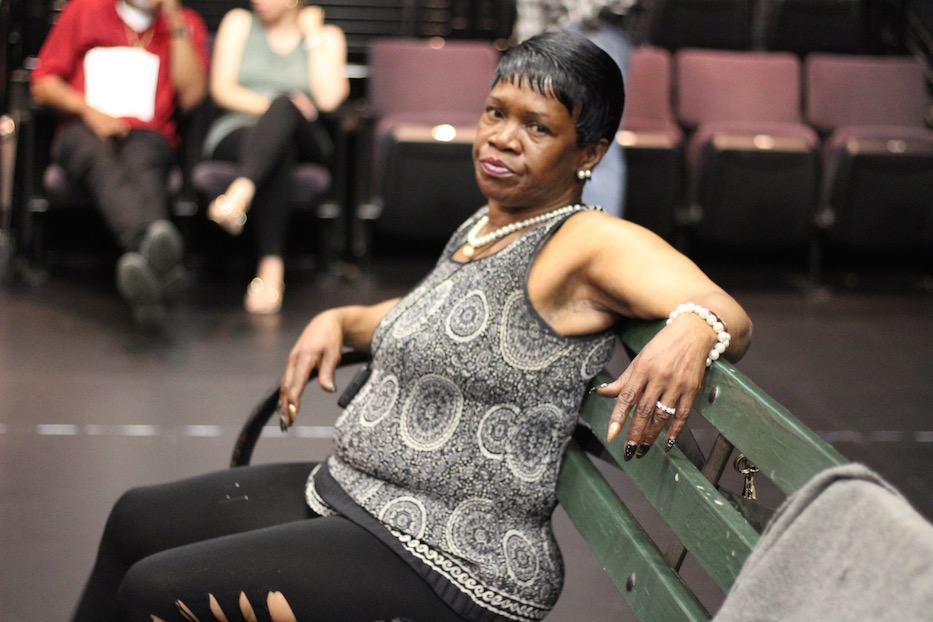
| Betty Williams, on a park bench that became a storytelling device for almost every member of the ensemble. |
No dice, Harvey told her, trying to massage the words. With a history of incarceration, she was better taking her name off the list and reapplying once she was newly homeless. He tiptoed around exactly what he needed to say before she left the office. Imre, as both fully herself and her actor self, was not one to mince words.
“What you mean is I don’t qualify,” she said bluntly, noting the number of men on the list who had already been given housing, despite previous jail time. Her voice caught. “All I want is a second chance.”
That sentiment, made all the more poignant by eponymous legislation that has passed in the state but is not widely recognized in the country, rippled through the show. One by one, cast members acted their scenes, then burst forward as themselves to announce how long they have been sober, or how they are staying clean, or how years of incarceration changed them.
Some, like Betty Williams, recalled years addicted to crack and then loosed a dove from her throat, accompanied as she sang “We’ve Come This Far By Faith.”
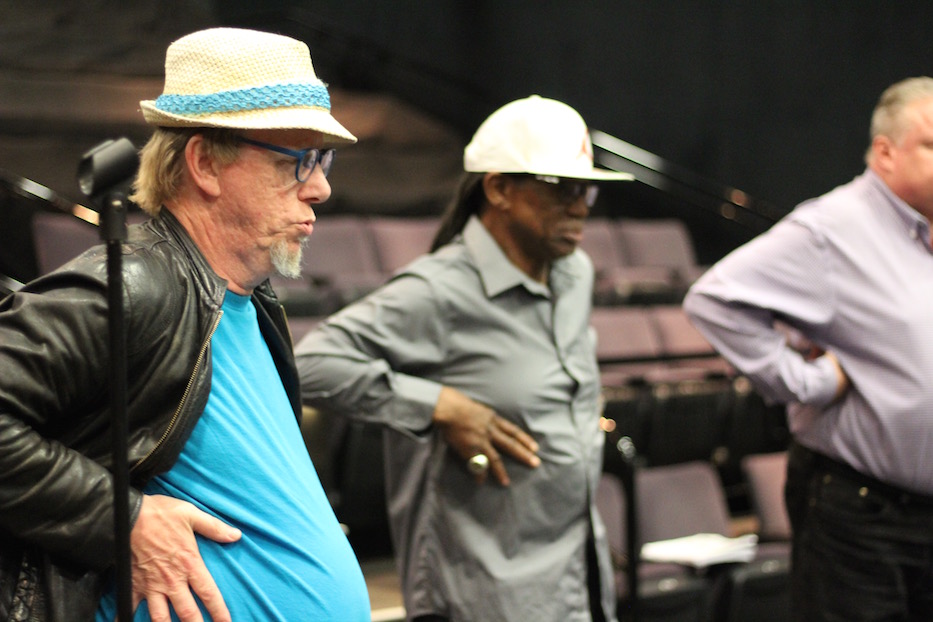
| Do Walker, who told the audience the story of his own recovery, which included a decision not to end his life. |
Others went into the way back machine, and pulled the audience with them. Rising from that first vignette, Griffith explained that he battled addiction from 1984 to 1993, and has since been sober for 26 years. Painting a vivid portrait of their friendship—and a parallel struggle through addiction—Richard Youins and Shannon Smith circled each other in an oval never wide enough for someone to catch up.
Alternating, the two told a story of New Haven decades ago, as Youins watched Smith grow up on Orchard Street, a little girl who played double dutch and hopscotch until the sun went down and her mother had to call her inside. Smith jumped on the stage, etched with New Haven’s signature nine squares, as if there were a hopscotch course drawn in chalk in front of her.
Several years later, each of them fell into addiction. They recalled individually seeing each other and feeling horrified, depressed, and hopeless.
“You watched me grow up,” Smith said at one point. “Why are things the way they are?”
Youins got help. Then Smith did the same thing, acting out her own recovery journey later in the performance. Now they are both supporting recovering addicts at CMHC. Smith looks to Youins as her mentor. But, she said to laughs, she thinks she can teach him a few things, too.
Like addiction, cast members also mined mental illness for dark humor, revelation, and straight up, unflinching testimony. At one point, bike advocate and serial joy spreader Paul Hammer took center stage, trailed by a spotlight. He was poised, it seemed, for a comedy set—which took a turn as he flipped it into a conversation around suicide and stigma.
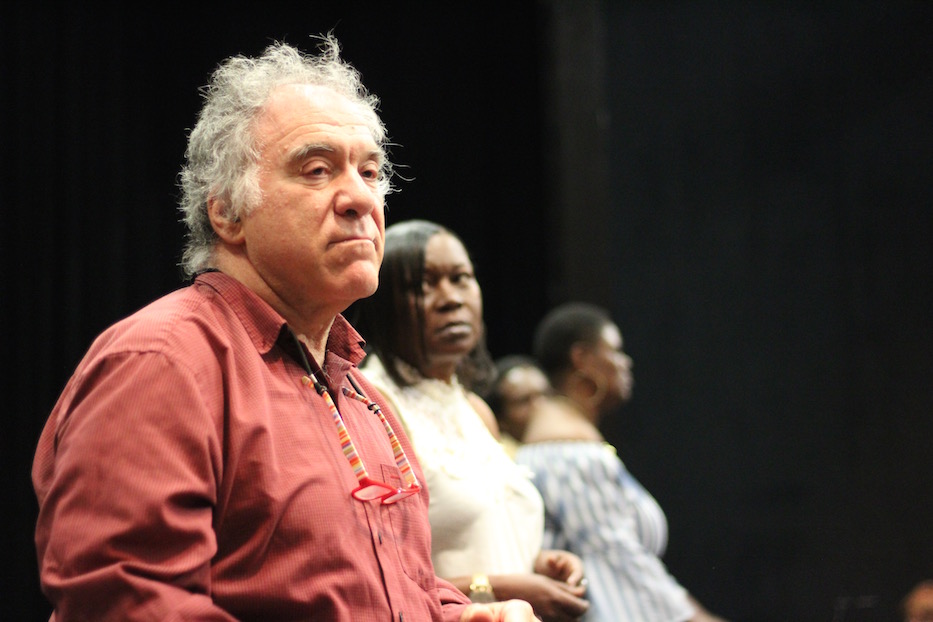
| Paul Hammer, who mined mental illness for biting comedy and then turned the tables to discuss the stigma that surrounds it. |
In another, the audience broke into measured laughter when Griffin mentioned the hold time on the 211 crisis emergency line (the audience may have been heavy on service providers and nonprofit professionals). Do Walker turned mental illness into a dark, bitter and biting punch line as he took the stage, motioned to a park bench at its center, and began to tell the story of a suicide attempt stopped by not wanting to ruin a truck driver’s day.
There was a grim truth there, perhaps, that outlived the show. Laughing in those types of situations—both for survivors and those who surround them—is the alternative to punching a hole through a wall. Because if one followed through with the latter option, there would be no public funding to fix that wall.
Between scenes, cast members worked in stinging and timely commentary on the opioid crisis by reading news reports aloud, weaving the giant, ugly role of big pharma into the minute, heart-rending details of their own lives. They recalled their own brushes with death and thoughts of suicide, making a sort of unspoken pact with the audience that they wouldn’t do the same thing ever again. They shared dance moves and details of their love lives, tilting ever upward toward joy.
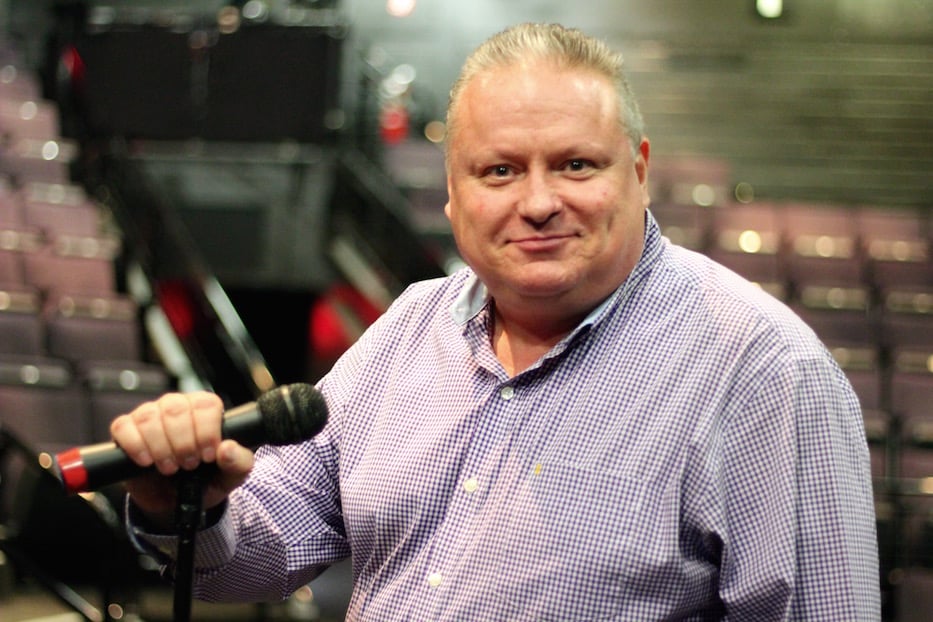
| Bob Forlano. During the performance, he shared that "the worst thing I've had to tackle is mental illness. I am not a prisoner of my own mind. Tonight, I stand before you a survivor." |
That’s the thing. In this world—the world of survivors, which does not end after a curtain call—there are no euphemisms for suicide or depression or relapse, no fancy way to talk about sobriety. Everything is there, splayed open, asking the audience to bear witness without judgement.
In this world—which is also our world—society is something that one must survive. This country has made it so hard to live with mental illness, with a record of incarceration, with a history of addiction, that surviving alone is a tremendous act. To rise is heroic, because society has made it so.
And these survivors do. Every time.
In With The Old, And With The New
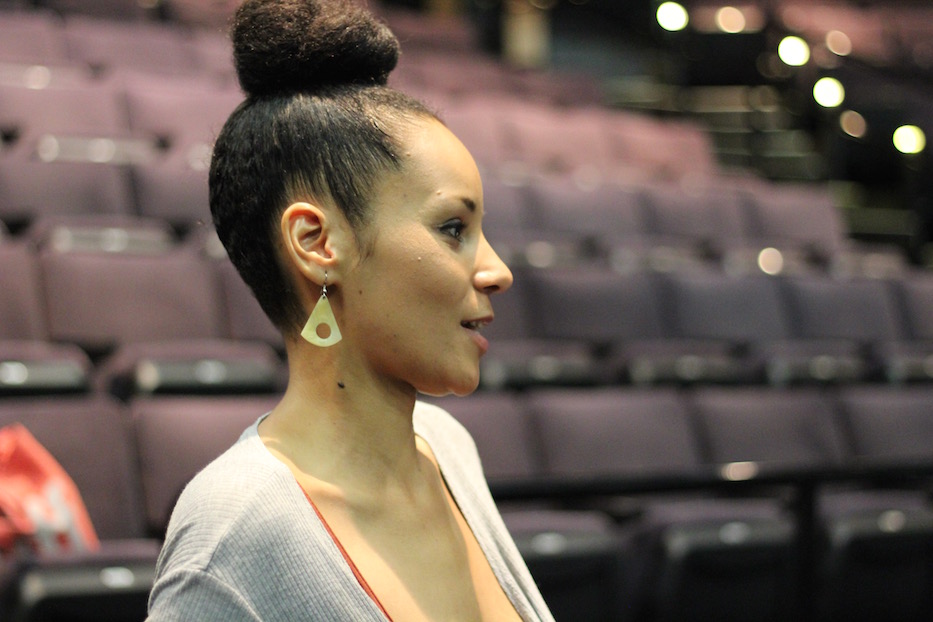
| Sharece Sellem: Bittersweet. |
Before the house opened once more on Sunday afternoon, Sharece Sellem was mourning the project’s conclusion backstage, as she ate a final lunch with residents of The Towers and IRIS’ young leaders. On one hand, she said, she didn’t want it to end. On the other, she was ready.
“It’s bittersweet, because this is what we worked toward,” she said. “And everyone has amazing stories.”
That sense—the bitter with the sweet, the memories that connect generations, cultures, and continents—permeated Sunday’s entire performance, from a first song from Solange and Josephine Jacques to final recitation from elders.
While Elder Play is unique in its form—residents from The Towers see and reflect on each show in Long Wharf’s season, and those reflections ultimately become the play—anecdotes from IRIS and Youth Continuum became intertwined quite accidentally, each feeding into the next.
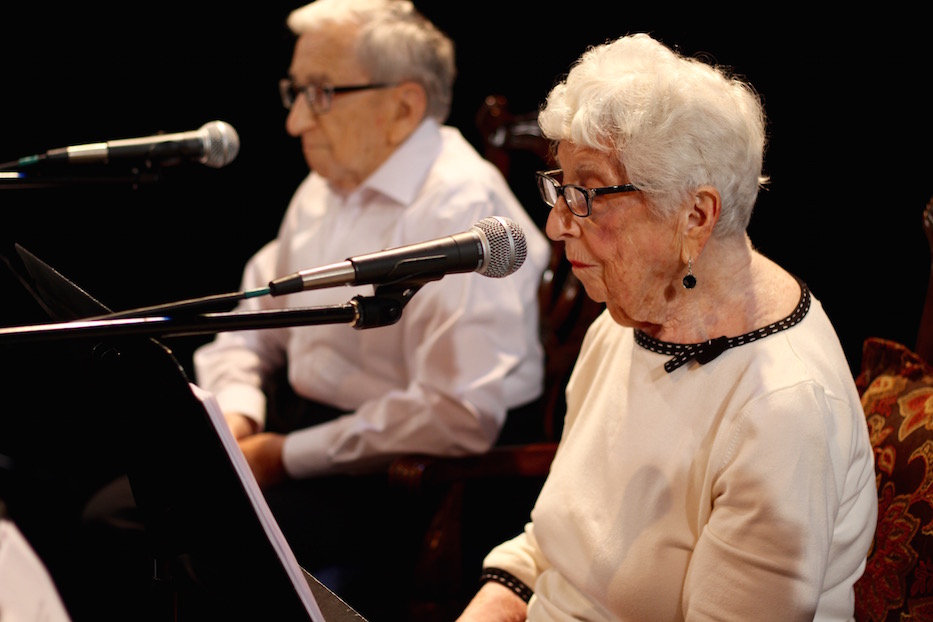
| Sylvia Rifkin, whose memories ranged from sneaking into a Frank Sinatra concert that was held for U.S. troops during WWII to the sheer pain of losing her husband. Izzy Juda is pictured to her right. |
In one, Sylvia Rifkin recalled the smell of her mother’s baking, an immediate sense of home palpable in the warm, sweet fog of her childhood kitchen. For Carlis Highsmith, that smell wasn’t a smell at all but a person—her grandmother, who has “been gone for over 20 years, but when we get together, she still the head.”
And then, as if she has been washed onto the stage and was still finding her feet, a new, younger face appeared—Zahara Callender, who left Barbados with her family and became suddenly rudderless.
Approaching the mic to sing Lewis Capaldi’s “Somebody You Loved," Callender recalled arriving in the U.S. and feeling incredibly lonely, like someone “kind of pulled a rug out from under my feet.” When she misses her friends, she said, she sings and they are not so far away after all.
Other anecdotes dug deep on American military involvement and the Holocaust, a reference to Long Wharf’s An Illiad that took on new meaning with refugees onstage, pandemonium in the DMZ, and a humanitarian crisis at the U.S.-Mexico border, where hundreds of scholars have agreed there is a very real analogue to concentration camps of the last century.
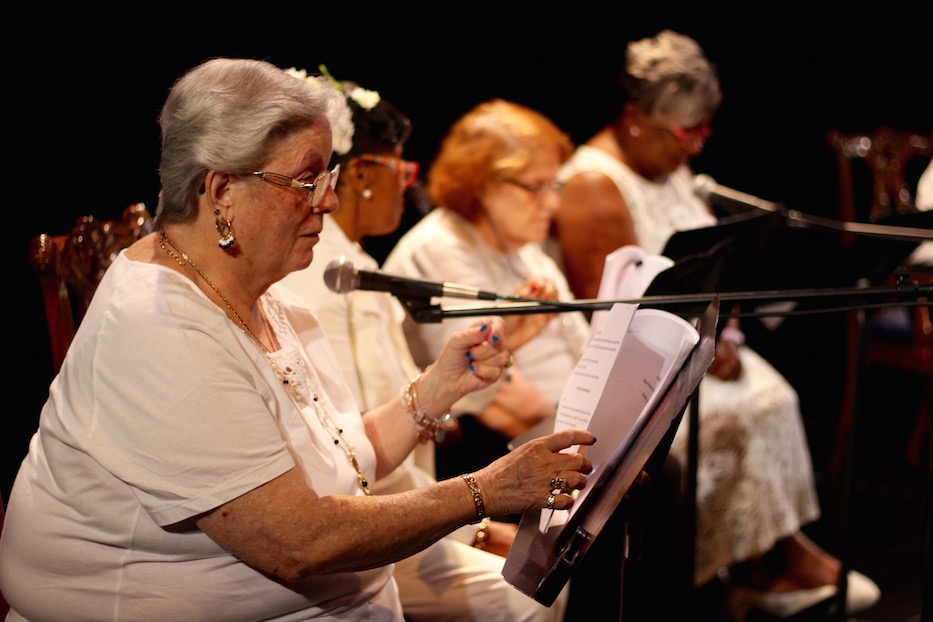
| From left to right: Orriel "Cookie" Razee, Acquetta Lewis, Barbara Noti, Carlis Highsmith. |
Isador Juda, who is more fondly known as “Izzy” around both the Towers and the city, gradually told the story of his escape from Austria during the Holocaust, during which he jumped from a train packed with Jews headed for concentration camps and crossed into Switzerland on foot.
He ultimately immigrated to the U.S., from which he went on to fight in the Pacific arena during World War Two. In detail, he described being shot in the lower leg, for which he made and tightened his own tourniquet, as a day he will never forget.
“It never stops,” he later said of the discrimination that allowed the war to happen. “And sadly, it will never stop.”
Those memories, accompanied by a voiceover from Dr. Martin Luther King, Jr. and chorus of “We Shall Overcome,” wove a through line from the legacy of Jim Crow to redlining, to the prison industrial complex and present-day anti-immigrant sentiment. Both Juda and Albert Zax urged the audience not to turn a blind eye to the current administration, which has used oppressive, xenophobic and well-worn vitriol to turn historically oppressed groups against each other.
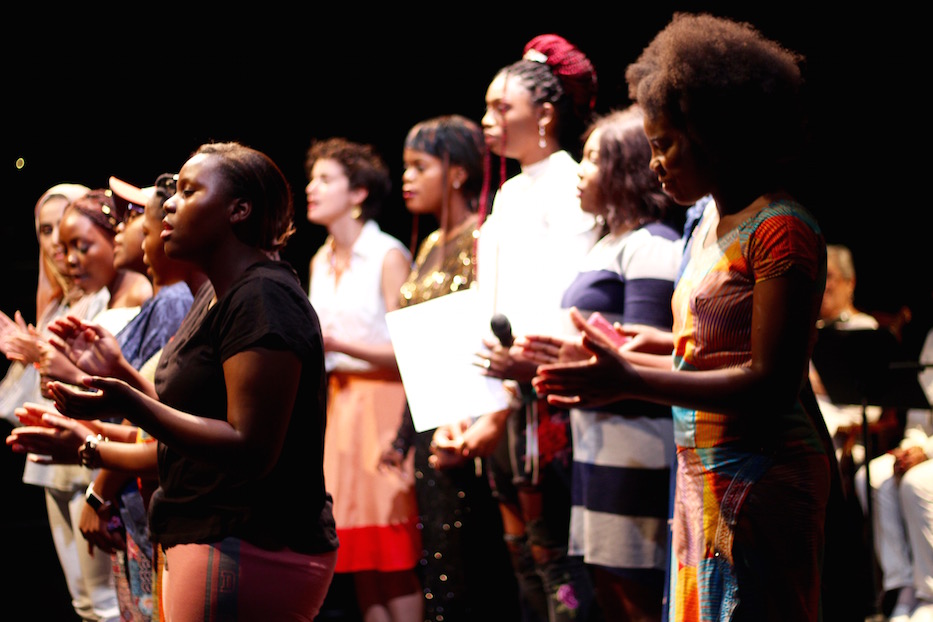
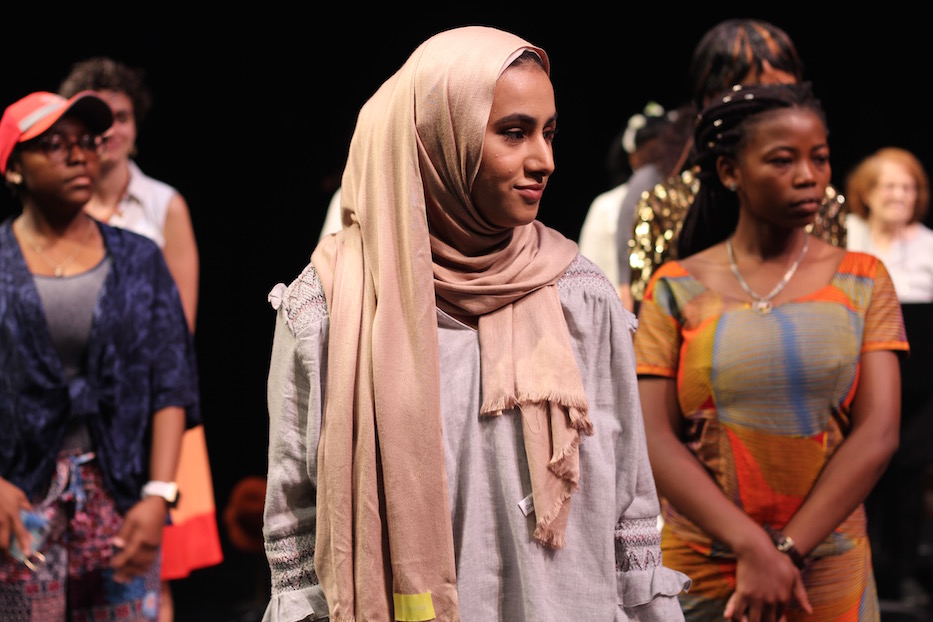
| Top: a choir comprising IRIS young leaders, who sang the same refrain in five different languages as the show wound down. Bottom, Noor Roomi. |
Zax (his part was read by understudy Paul Hammer) recalled a boss who cautioned him to “be careful” about his professional alliances, which included colleagues of color and ultimately cost him a promotion. Barbara Noti took that in a different direction, recalling her antiwar activism after realizing that tear gas was circulating through the air at her university. Both of their words found stunning resonance in a spoken word piece from poet Pedro Hanlan, a member of the Youth Advisory Board at Youth Continuum (read some of it here).
So too did the day’s sense of unbridled joy. As elders channeled a performance of Paradise Blue, conjuring the musicians of their youth, four young leaders took the stage to dance it out. When they spoke about sewing the pieces of a life together, it was a literal response to an IRIS fashion show, in which young leaders paraded the bright fabrics, long, swooping cuts, and handmade designs of their home countries. When leaders gathered in a multilingual choir close to the end, elders pondered the physicality of home one last time.
That ended, not surprising, by bringing it home. As if responding directly to Juda's memories—he was ultimately reunited with his family, who were able to flee to the United States—Mahoundi seemed to have her own present-day parallel, recalling those words that her grandfather had told her the last time she saw him.
Home, he told her, was anywhere she wanted it to be. She just had to will it to be so.
“I see you,” Mahoundi gestured around the stage, and then the theater. “And I see home.”

